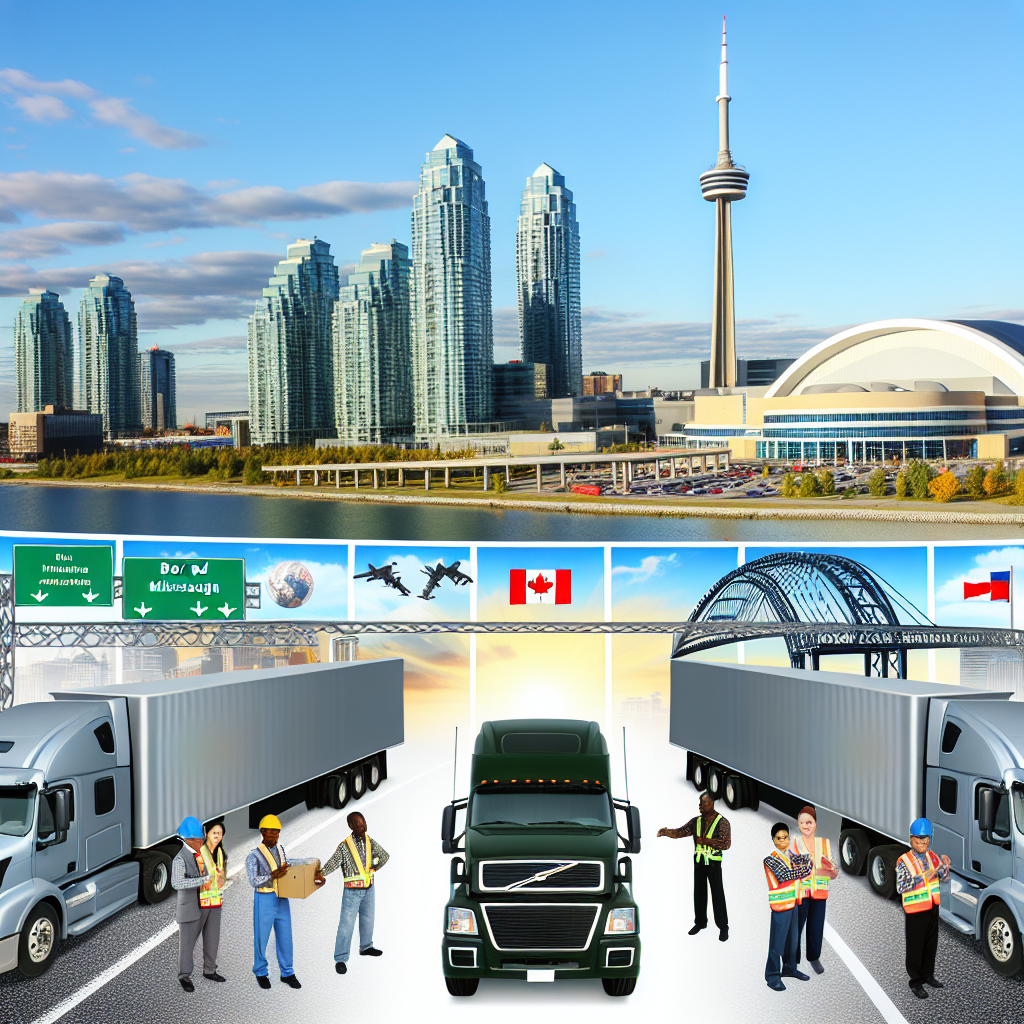Bridging Border Barriers
The upcoming Truckload Carriers Association (TCA) event, titled Bridging Border Barriers, is more than just a gathering—it’s a critical platform for addressing some of the most pressing challenges in the trucking and logistics sectors today.
Scheduled for November 19 in Mississauga, Ontario, this annual meeting brings together industry stalwarts and thought leaders to discuss vital topics, including the intricacies of cross-border trucking, which have become increasingly complex in recent years.
Participants will delve into essential regulatory updates surrounding emissions standards and autonomous vehicle policies, crucial for fleets to remain compliant in an evolving landscape.
Additionally, the event will explore economic trends impacting fleet operations, providing stakeholders with insights that can influence strategies and decision-making.
As the industry navigates these challenges and transforms, the relevance of this gathering to both seasoned and new participants cannot be overstated. Join us to connect, learn, and prepare for the future of trucking.
| Date | Location | Key Speakers | Topics |
|---|---|---|---|
| Nov. 19 | Mississauga, Ontario | David Heller (TCA’s Senior VP) | Cross-border issues, regulatory updates |
| Arun Rebello (TD Bank) | Industry risks, economic trends impacting fleets |
2. Regulatory Updates
A major part of the conference will focus on regulatory updates. David Heller, TCA’s Senior Vice President of Safety and Government Affairs, will talk about the changing regulations that impact trucking logistics and supply chain management. Key topics will cover updates on emissions standards. This includes new greenhouse gas emissions standards for heavy-duty vehicles set by the U.S. Environmental Protection Agency, which aim for compliance from 2027 to 2032. Heller will also explain how these changes impact fleets trying to comply with different laws in various regions, emphasizing the role of effective supply chain management in maintaining compliance and operational efficiency.

An image showcasing trucking and logistics themes related to the TCA event.
The quotes from industry leaders at the Truckload Carriers Association (TCA) event underscore the critical importance of cross-border issues and regulatory updates within the trucking industry.
-
Mark Seymour, CEO of Kriska Transportation Group, expressed frustration regarding the misclassification of employee truckers as personal services businesses, known as the Driver Inc. model. He articulated,
“Carriers are pissed. The government simply doesn’t want to do anything.”
This statement highlights the significant competitive disadvantage traditional fleets face due to this regulatory approach. Furthermore, Seymour noted,
“Now it’s a big problem and yes, we’re losing a lot of business,”
indicating the direct impact of regulatory inaction on business operations and profitability within the trucking sector.
-
Joe Beacom, Vice President and Chief Safety and Operations Officer for Landstar System, dealt with the uncertainties surrounding tariffs and their potential industry-wide ramifications. He remarked,
“Uncertainty is not our friend,”
emphasizing how fluctuating tariff policies introduce complications for carriers. Beacom’s comments about nearshoring initiatives, or the practice of relocating manufacturing closer to North America, further illustrate how regulatory changes can create a climate of confusion and stress for logistics providers.
“That uncertainty is driving people bananas,”
he stated, capturing the frustration felt industry-wide as stakeholders adapt to rapid changes.
-
Murray Mullen, Chairman and CEO of Mullen Group, voiced his concerns over an increasingly stringent regulatory environment in Canada.
“In Canada, we’re seeing a move towards telling us what to do all the time,”
he said, pointing out the risks this trend poses to entrepreneurial innovation in the trucking industry. Mullen’s observation that regulatory uniformity often forces industry players to act similarly—
“They’re trying to regulate us into doing something that we all have to do exactly the same thing at the same time”
—alerts us to the need for flexibility in regulations that allow for diverse business models.
-
Lastly, Jim Ward, President of TCA, expressed optimism about recent regulatory changes, particularly during the Trump administration. He noted that members are
“very enthusiastic about some of the changes that they are seeing being made by some of the secretaries and administrators,”
particularly for emissions rules. Ward also emphasized the need for policies that balance environmental goals with industry capabilities, stating,
“You have to have the equipment and the technology to do what you need to do so you can continue to service your customers and provide a quality work environment for your professional driving employees.”
These statements not only capture the diverse viewpoints present within the industry but also highlight the pressing need for adaptive, sensible regulations that accommodate both competitive practices and emerging industry challenges. As discussed at the TCA event, addressing these cross-border issues and regulatory frameworks will be essential for enabling fleet operations to thrive in an increasingly complex landscape.
Economic Impact of Regulatory Updates and Cross-Border Policies on Fleet Operations
The discussions pertaining to regulatory updates provide a foundation for understanding the economic implications these changes have on fleet operations. As we dive into the specific impacts, it’s evident that adapting to these regulations is not just a matter of compliance, but a strategic necessity for companies operating in the logistics sector.
Regulatory Updates Revolutionizing Fleet Operations
The logistics and trucking industry is currently navigating a complex landscape shaped by regulatory updates and cross-border policies. These changes present both challenges and opportunities for fleet operations, emphasizing the need for operational flexibility and an adaptive approach.
As we conclude our exploration of the Truckload Carriers Association (TCA) event, it is evident that the discussions on cross-border challenges, regulatory updates, and economic trends are not just timely but essential for the future of the trucking industry.
The upcoming Bridging Border Barriers event serves as a vital forum where industry leaders come together to address complex issues that directly impact fleet operations and strengthen the logistics framework.
Stakeholders are encouraged to engage with the outcomes of this event, as the insights shared will help shape strategic decisions and foster compliance in a rapidly evolving regulatory landscape.
To stay informed, we urge readers to follow the developments and regulatory updates that emerge from this significant gathering, ensuring that they are prepared to navigate the challenges ahead in the trucking sector.
Trends in User Adoption of Technology Solutions in Trucking
The trucking industry is witnessing a significant transformation through the adoption of technology solutions aimed at addressing regulatory compliance and cross-border logistics challenges. Recent studies reveal several key trends:
1. Digital Transformation and Compliance
- Electronic Logging Devices (ELDs): Approximately 60 percent of carriers have integrated ELDs to comply with Hours of Service (HOS) regulations, which enhance monitoring and reporting accuracy.
- Telematics and Fleet Management: Over 85 percent of trucking fleets now utilize GPS tracking systems, which help in improving route planning and security.
- Data Analytics: A substantial 80 percent of trucking firms identify data analytics as essential for operational improvements, assisting in compliance and efficiency measures.
2. Artificial Intelligence (AI) Integration
- Predictive Maintenance: The application of AI-powered predictive maintenance has reduced truck downtime by 30 percent, thereby boosting operational efficiency.
- Route Optimization: AI solutions have elevated load optimization efficiency by over 20 percent, contributing to reduced costs and idle time.
- Investment Trends: A notable 65 percent of trucking companies have started adopting various forms of AI technology, with about 52 percent planning to enhance their AI investment in the next two years.
3. Blockchain for Cross-Border Logistics
- Customs Clearance: Utilizing blockchain technology facilitates the creation of immutable documentation records and offers real-time tracking of customs statuses, which greatly decreases paperwork and processing times.
- Supply Chain Transparency: The incorporation of blockchain within supply chain management has increased transparency and decreased documentation errors by over 25 percent.
4. Challenges in Technology Adoption
- Data Security Concerns: Approximately 19 percent of U.S. transport and shipping professionals cite data quality and security issues as the primary barrier to AI investment.
- Technical Expertise: About 13 percent of firms report a lack of in-house expertise to implement AI solutions effectively.
- Regulatory Compliance Costs: A significant 64 percent of respondents indicate that regulations have pushed operational costs upwards by 1 to 10 percent, particularly highlighting the impact of environmental and trade/customs regulations.
These trends indicate a strong commitment from the trucking industry to leverage technology to meet regulatory requirements and tackle cross-border logistics challenges, despite facing notable hurdles in terms of adoption and compliance.
List of Participant Companies at TCA Event
The following companies are notable participants at the upcoming Truckload Carriers Association (TCA) event titled Bridging Border Barriers, showcasing their commitment to addressing cross-border and regulatory issues within the trucking industry:
- Kriska Transportation Group
Role: Engages in conversations around recruiting and retention best practices, acknowledging the importance of workforce management in regulatory compliance. - Bison Transport
Role: Participates in discussions focused on safety and driver development, emphasizing the need for compliance with safety regulations. - Challenger Motor Freight
Role: Contributions to panels regarding electronic logging device mandates and data, highlighting the technological needs for regulatory compliance. - Erb Group of Companies
Role: Focuses on safety and security strategy panels, addressing regulatory challenges in maintaining operational standards. - Northbridge Insurance
Role: Engages in discussions around electronic logging device mandates, playing a vital role in insurance solutions that support safe operations. - KRTS Transportation Specialists
Role: Involved in safety and security strategy panels, providing insights into best practices for compliance and risk management. - Wellington Group of Companies
Role: Participates in panels on recruiting and retention best practices, linking workforce strategies to regulatory adherence. - Brian Kurtz Trucking
Role: Contributions on discussions surrounding recruitment strategies, emphasizing the link between workforce retention and regulatory compliance. - Private Motor Truck Council of Canada (PMTC)
Role: Active in transportation association executive roundtables, addressing industry-wide regulatory challenges and solutions. - Ontario Trucking Association (OTA)
Role: Engages in executive discussions to tackle complex regulatory issues affecting the trucking sector, promoting industry collaboration. - Truckload Carriers Association (TCA)
Role: As the host, they lead discussions on overarching regulatory challenges in the industry, coordinating efforts among various stakeholders.
These participants underscore their pivotal roles in fostering collaboration among industry stakeholders, striving jointly to navigate the complexities of cross-border trucking and regulatory compliance.
By participating in the TCA event, these companies aim to strengthen industry practices and advocate for effective regulatory measures that enhance operations and improve compliance across the board.
Key Takeaways from the TCA Event
- Cross-Border Challenges: A focus on tackling the increasing complexities of cross-border trucking regulations and processes.
- Regulatory Updates: Insights on current and upcoming regulations affecting the trucking industry, including emissions standards and autonomous vehicle policies.
- Economic Trends: Discussion on economic influences on fleet operations, highlighting volatility in the market and operational cost implications.
- Emissions Compliance: The importance of adhering to stringent emissions regulations, with emphasis on transitioning to cleaner technologies.
- Safety Innovations: Addressing advancements like Automatic Emergency Braking (AEB) systems intended to enhance safety.
- Mitigation Strategies: The necessity of robust strategies to address rising operational costs and potential risks, including cyber threats and regulatory compliance challenges.
- Stakeholder Collaboration: The event serves as a crucial platform for industry collaboration to share insights and strategies, fostering a unified response to regulatory challenges.
- Future Readiness: The insights gained from this gathering will be essential for stakeholders to prepare for ongoing changes in the trucking landscape.
Emotional Engagement
To further emphasize the event’s significance, consider the words of Jim Ward, President of TCA, who remarked, “This event is not just about compliance; it’s about shaping the future of our industry and providing a forum where everyone can voice their concerns and ideas.” Participation in the TCA’s annual meeting creates a sense of community among industry stakeholders, fostering collaborative solutions to complex challenges. As articulated by Murray Mullen, Chairman and CEO of Mullen Group, “We all face the same issues. Together, we can bring innovative ideas that lead to better practices and mutual benefit.” Join your fellow professionals in promoting industry growth and resilience.
This gathering promises to be a pivotal moment for professionals in the trucking industry, making it vital to engage with the insights and strategies that will be shared.


